


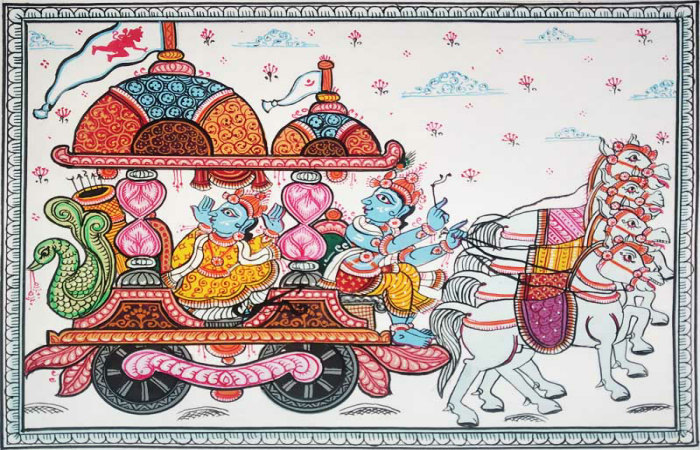
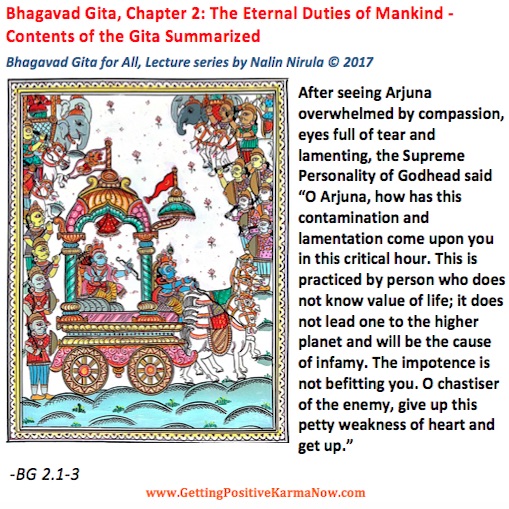
Arjun is paralyzed by grief on seeing his relatives arrayed against him on the battlefield. Seeing Arjun in such a condition of depression and anxiety, Krishna speaks to Arjun those words meant to remove the darkest of ignorance and fear.
Bhagavad Gita 2.1
sañjaya uvāca
taṁ tathā kṛpayāviṣṭam
aśru-pūrṇākulekṣaṇam
viṣīdantam idaṁ vākyam
uvāca madhusūdanaḥ
Synonyms
sañjayaḥ uvāca — Sañjaya said; tam — unto Arjuna; tathā — thus; kṛpayā — by compassion; āviṣṭam — overwhelmed; aśru-pūrṇa-ākula — full of tears; īkṣaṇam — eyes; viṣīdantam — lamenting; idam — these; vākyam — words; uvāca — said; madhu-sūdanaḥ — the killer of Madhu.
Bhagavad Gita 2.2
śrī-bhagavān uvāca
kutas tvā kaśmalam idaṁ
viṣame samupasthitam
anārya-juṣṭam asvargyam
akīrti-karam arjuna
Synonyms
śrī-bhagavān uvāca — the Supreme Personality of Godhead said; kutaḥ — wherefrom; tvā — unto you; kaśmalam — dirtiness; idam — this lamentation; viṣame — in this hour of crisis; samupasthitam — arrived; anārya — persons who do not know the value of life; juṣṭam — practiced by; asvargyam — which does not lead to higher planets; akīrti — infamy; karam — the cause of; arjuna — O Arjuna.
Bhagavad Gita 2.3
klaibyaṁ mā sma gamaḥ pārtha
naitat tvayy upapadyate
kṣudraṁ hṛdaya-daurbalyaṁ
tyaktvottiṣṭha paran-tapa
Synonyms
klaibyam — impotence; mā sma — do not; gamaḥ — take to; pārtha — O son of Pṛthā; na — never; etat — this; tvayi — unto you; upapadyate — is befitting; kṣudram — petty; hṛdaya — of the heart; daurbalyam — weakness; tyaktvā — giving up; uttiṣṭha — get up; param-tapa — O chastiser of the enemies
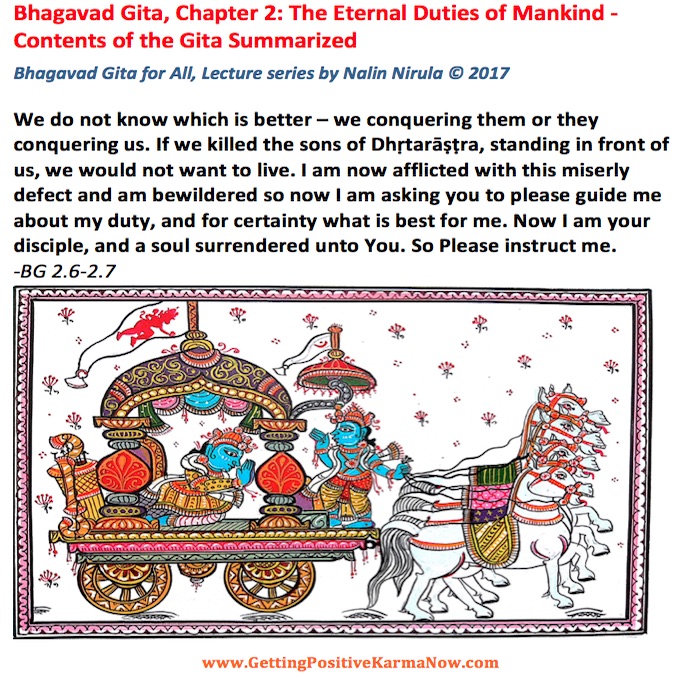
Demoralized, traumatized and grief-stricken at the prospect of deaths of so many family members at his behest, Arjun admits he is unable to see what is right action for him in this situation.Confused, and in desperation, Arjun surrenders to Krishna as His student and disciple. Arjun begs guidance as to the proper action for him to take.
Bhagavad Gita 2.4
arjuna uvāca
kathaṁ bhīṣmam ahaṁ saṅkhye
droṇaṁ ca madhusūdana
iṣubhiḥ pratiyotsyāmi
pūjārhāv ari-sūdana
Synonyms
arjunaḥ uvāca — Arjuna said; katham — how; bhīṣmam — Bhīṣma; aham — I; saṅkhye — in the fight; droṇam — Droṇa; ca — also; madhu-sūdana — O killer of Madhu; iṣubhiḥ — with arrows; pratiyotsyāmi — shall counterattack; pūjā-arhau — those who are worshipable; ari–sūdana — O killer of the enemies.
Bhagavad Gita 2.5
gurūn ahatvā hi mahānubhāvān
śreyo bhoktuṁ bhaikṣyam apīha loke
hatvārtha-kāmāṁs tu gurūn ihaiva
bhuñjīya bhogān rudhira-pradigdhān
Synonyms
gurūn — the superiors; ahatvā — not killing; hi — certainly; mahā-anubhāvān — great souls; śreyaḥ — it is better; bhoktum — to enjoy life; bhaikṣyam — by begging; api — even; iha — in this life; loke — in this world; hatvā — killing; artha — gain; kāmān — desiring; tu — but; gurūn — superiors; iha — in this world; eva — certainly; bhuñjīya — one has to enjoy; bhogān — enjoyable things; rudhira — blood; pradigdhān — tainted with.
Bhagavad Gita 2.6
na caitad vidmaḥ kataran no garīyo
yad vā jayema yadi vā no jayeyuḥ
yān eva hatvā na jijīviṣāmas
te ’vasthitāḥ pramukhe dhārtarāṣṭrāḥ
Synonyms
na — nor; ca — also; etat — this; vidmaḥ — do we know; katarat — which; naḥ — for us; garīyaḥ — better; yat vā — whether; jayema — we may conquer; yadi — if; vā — or; naḥ — us; jayeyuḥ — they conquer; yān — those who; eva — certainly; hatvā — by killing; na — never; jijīviṣāmaḥ — we would want to live; te — all of them; avasthitāḥ — are situated; pramukhe — in the front; dhārtarāṣṭrāḥ — the sons of Dhṛtarāṣṭra.
Bhagavad Gita 2.7
kārpaṇya-doṣopahata-svabhāvaḥ
pṛcchāmi tvāṁ dharma-sammūḍha-cetāḥ
yac chreyaḥ syān niścitaṁ brūhi tan me
śiṣyas te ’haṁ śādhi māṁ tvāṁ prapannam
Synonyms
kārpaṇya — of miserliness; doṣa — by the weakness; upahata — being afflicted; svabhāvaḥ — characteristics; pṛcchāmi — I am asking; tvām — unto You; dharma — religion; sammūḍha — bewildered; cetāḥ — in heart; yat — what; śreyaḥ — all-good; syāt — may be; niścitam — confidently; brūhi — tell; tat — that; me — unto me; śiṣyaḥ — disciple; te — Your; aham — I am; śādhi — just instruct; mām — me; tvām — unto You; prapannam — surrendered.
Bhagavad Gita 2.8
na hi prapaśyāmi mamāpanudyād
yac chokam ucchoṣaṇam indriyāṇām
avāpya bhūmāv asapatnam ṛddhaṁ
rājyaṁ surāṇām api cādhipatyam
Synonyms
na — do not; hi — certainly; prapaśyāmi — I see; mama — my; apanudyāt — can drive away; yat — that which; śokam — lamentation; ucchoṣaṇam — drying up; indriyāṇām — of the senses; avāpya — achieving; bhūmau — on the earth; asapatnam — without rival; ṛddham — prosperous; rājyam — kingdom; surāṇām — of the demigods; api — even; ca — also; ādhipatyam — supremacy.
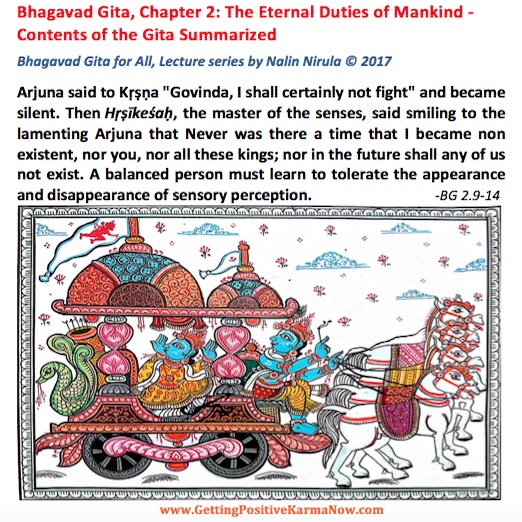
Overcome by sentiment and the attachment to his family and relatives, Arjun gives up and declines to fight.He would sooner live by begging or die himself rather than kill his relatives–even in the cause of righteousness. Arjun puts the life of his evil-minded relatives as paramount over fulfilling his duty and dharma. With a sarcastic smile Lord Krishna calls Arjun out on this self-serving weakness, and points out the facts.
Bhagavad Gita 2.9
sañjaya uvāca
evam uktvā hṛṣīkeśaṁ
guḍākeśaḥ paran-tapaḥ
na yotsya iti govindam
uktvā tūṣṇīṁ babhūva ha
Synonyms
sañjayaḥ uvāca — Sañjaya said; evam — thus; uktvā — speaking; hṛṣīkeśam — unto Kṛṣṇa, the master of the senses; guḍākeśaḥ — Arjuna, the master of curbing ignorance; param-tapaḥ — the chastiser of the enemies; na yotsye — I shall not fight; iti — thus; govindam — unto Kṛṣṇa, the giver of pleasure to the senses; uktvā — saying; tūṣṇīm — silent; babhūva — became; ha — certainly.
Bhagavad Gita 2.10
tam uvāca hṛṣīkeśaḥ
prahasann iva bhārata
senayor ubhayor madhye
viṣīdantam idaṁ vacaḥ
Synonyms
tam — unto him; uvāca — said; hṛṣīkeśaḥ — the master of the senses, Kṛṣṇa; prahasan — smiling; iva — like that; bhārata — O Dhṛtarāṣṭra, descendant of Bharata; senayoḥ — of the armies; ubhayoḥ — of both parties; madhye — between; viṣīdantam — unto the lamenting one; idam — the following; vacaḥ — words.
Bhagavad Gita 2.11
śrī-bhagavān uvāca
aśocyān anvaśocas tvaṁ
prajñā-vādāṁś ca bhāṣase
gatāsūn agatāsūṁś ca
nānuśocanti paṇḍitāḥ
Synonyms
śrī-bhagavān uvāca — the Supreme Personality of Godhead said; aśocyān — not worthy of lamentation; anvaśocaḥ — you are lamenting; tvam — you; prajñā-vādān — learned talks; ca — also; bhāṣase — speaking; gata — lost; asūn — life; agata — not passed; asūn — life; ca — also; na — never; anuśocanti — lament; paṇḍitāḥ — the learned.
Bhagavad Gita 2.12
na tv evāhaṁ jātu nāsaṁ
na tvaṁ neme janādhipāḥ
na caiva na bhaviṣyāmaḥ
sarve vayam ataḥ param
Synonyms
na — never; tu — but; eva — certainly; aham — I; jātu — at any time; na — did not; āsam — exist; na — not; tvam — you; na — not; ime — all these; jana-adhipāḥ — kings; na — never; ca — also; eva — certainly; na — not; bhaviṣyāmaḥ — shall exist; sarve vayam — all of us; ataḥ param — hereafter.
Bhagavad Gita 2.13
dehino ’smin yathā dehe
kaumāraṁ yauvanaṁ jarā
tathā dehāntara-prāptir
dhīras tatra na muhyati
Synonyms
dehinaḥ — of the embodied; asmin — in this; yathā — as; dehe — in the body; kaumāram — boyhood; yauvanam — youth; jarā — old age; tathā — similarly; deha-antara — of transference of the body; prāptiḥ — achievement; dhīraḥ — the sober; tatra — thereupon; na — never; muhyati — is deluded.
Bhagavad Gita 2.14
mātrā-sparśās tu kaunteya
śītoṣṇa-sukha-duḥkha-dāḥ
āgamāpāyino ’nityās
tāṁs titikṣasva bhārata
Synonyms
mātrā-sparśāḥ — sensory perception; tu — only; kaunteya — O son of Kuntī; śīta — winter; uṣṇa — summer; sukha — happiness; duḥkha — and pain; dāḥ — giving; āgama — appearing; apāyinaḥ — disappearing; anityāḥ — nonpermanent; tān — all of them; titikṣasva — just try to tolerate; bhārata — O descendant of the Bharata dynasty.

Lord Kṛṣṇa explains to Arjun that the perishable body houses the imperishable, ‘sat’ consciousness and soul-self.
Being full with soul-consciousness eliminates pain and sorrow, while bodily consciousness is the cause of sorrow and pain.
Arjun is advised to be tolerant the appearance & disappearance of the ‘asat’– the changeable.
That which is ‘asat’ can never become ‘sat’ or permanent, and that which is constant, ‘sat’ can never be destroyed.
Bhagavad Gita 2.15
yaṁ hi na vyathayanty ete
puruṣaṁ puruṣarṣabha
sama-duḥkha-sukhaṁ dhīraṁ
so ’mṛtatvāya kalpate
Synonyms
yam — one to whom; hi — certainly; na — never; vyathayanti — are distressing; ete — all these; puruṣam — to a person; puruṣa-ṛṣabha — O best among men; sama — unaltered; duḥkha — in distress; sukham — and happiness; dhīram — patient; saḥ — he; amṛtatvāya — for liberation; kalpate — is considered eligible.
Bhagavad Gita 2.16
nāsato vidyate bhāvo
nābhāvo vidyate sataḥ
ubhayor api dṛṣṭo ’ntas
tv anayos tattva-darśibhiḥ
Synonyms:
na — never; asataḥ — of the nonexistent; vidyate — there is; bhāvaḥ — endurance; na — never; abhāvaḥ — changing quality; vidyate — there is; sataḥ — of the eternal; ubhayoḥ — of the two; api — verily; dṛṣṭaḥ — observed; antaḥ — conclusion; tu — indeed; anayoḥ — of them; tattva — of the truth; darśibhiḥ — by the seers.
Bhagavad Gita 2.17
avināśi tu tad viddhi
yena sarvam idaṁ tatam
vināśam avyayasyāsya
na kaścit kartum arhati
Synonyms
avināśi — imperishable; tu — but; tat — that; viddhi — know it; yena — by whom; sarvam — all of the body; idam — this; tatam — pervaded; vināśam — destruction; avyayasya — of the imperishable; asya — of it; na kaścit — no one; kartum — to do; arhati — is able.
Bhagavad Gita 2.18
antavanta ime dehā
nityasyoktāḥ śarīriṇaḥ
anāśino ’prameyasya
tasmād yudhyasva bhārata
Synonyms
anta-vantaḥ — perishable; ime — all these; dehāḥ — material bodies; nityasya — eternal in existence; uktāḥ — are said; śarīriṇaḥ — of the embodied soul; anāśinaḥ — never to be destroyed; aprameyasya — immeasurable; tasmāt — therefore; yudhyasva — fight; bhārata — O descendant of Bharata.
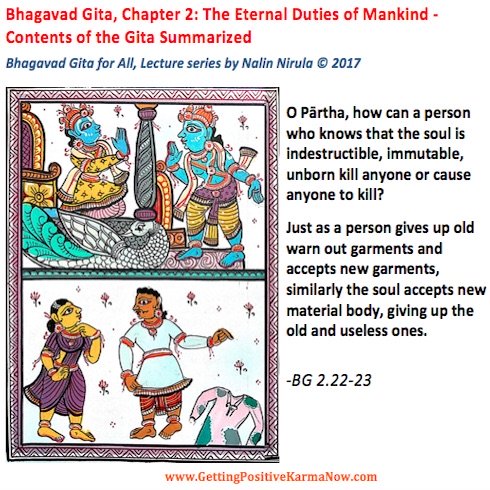
Lord Kṛṣṇa tells Arjun, ‘He who is in knowledge, knows that the self is not killed and the soul self never kills…’
This is not to encourage killing, but in the interest of righteous action, killing is permitted according to regulations.
Killing is never whimsical or random. It is the duty of a kshatriya (Arjun) to fight for the protection of the population and the weak, according to his dharma.
Bhagavad Gita 2.19
ya enaṁ vetti hantāraṁ
yaś cainaṁ manyate hatam
ubhau tau na vijānīto
nāyaṁ hanti na hanyate
Synonyms
yaḥ — anyone who; enam — this; vetti — knows; hantāram — the killer; yaḥ — anyone who; ca — also; enam — this; manyate — thinks; hatam — killed; ubhau — both; tau — they; na — never; vijānītaḥ — are in knowledge; na — never; ayam — this; hanti — kills; na — nor; hanyate — is killed.
Bhagavad Gita 2.20
na jāyate mriyate vā kadācin
nāyaṁ bhūtvā bhavitā vā na bhūyaḥ
ajo nityaḥ śāśvato ’yaṁ purāṇo
na hanyate hanyamāne śarīre
Synonyms
na — never; jāyate — takes birth; mriyate — dies; vā — either; kadācit — at any time (past, present or future); na — never; ayam — this; bhūtvā — having come into being; bhavitā — will come to be; vā — or; na — not; bhūyaḥ — or is again coming to be; ajaḥ — unborn; nityaḥ — eternal; śāśvataḥ — permanent; ayam — this; purāṇaḥ — the oldest; na — never; hanyate — is killed; hanyamāne — being killed; śarīre — the body.
Bhagavad Gita 2.21
vedāvināśinaṁ nityaṁ
ya enam ajam avyayam
kathaṁ sa puruṣaḥ pārtha
kaṁ ghātayati hanti kam
Synonyms
veda — knows; avināśinam — indestructible; nityam — always existing; yaḥ — one who; enam — this (soul); ajam — unborn; avyayam — immutable; katham — how; saḥ — that; puruṣaḥ — person; pārtha — O Pārtha (Arjuna); kam — whom; ghātayati — causes to hurt; hanti — kills; kam — whom.
Bhagavad Gita 2.22
vāsāṁsi jīrṇāni yathā vihāya
navāni gṛhṇāti naro ’parāṇi
tathā śarīrāṇi vihāya jīrṇāny
anyāni saṁyāti navāni dehī
Synonyms
vāsāṁsi — garments; jīrṇāni — old and worn out; yathā — just as; vihāya — giving up; navāni — new garments; gṛhṇāti — does accept; naraḥ — a man; aparāṇi — others; tathā — in the same way; śarīrāṇi — bodies; vihāya — giving up; jirṇāni — old and useless; anyāni — different; saṁyāti — verily accepts; navāni — new sets; dehī — the embodied.
Bhagavad Gita 2.23
nainaṁ chindanti śastrāṇi
nainaṁ dahati pāvakaḥ
na cainaṁ kledayanty āpo
na śoṣayati mārutaḥ
Synonyms
na — never; enam — this soul; chindanti — can cut to pieces; śastrāṇi — weapons; na — never; enam — this soul; dahati — burns; pāvakaḥ — fire; na — never; ca — also; enam — this soul; kledayanti — moistens; āpaḥ — water; na — never; śoṣayati — dries; mārutaḥ — wind.
Bhagavad Gita 2.24
acchedyo ’yam adāhyo ’yam
akledyo ’śoṣya eva ca
nityaḥ sarva-gataḥ sthāṇur
acalo ’yaṁ sanātanaḥ
Synonyms
acchedyaḥ — unbreakable; ayam — this soul; adāhyaḥ — unable to be burned; ayam — this soul; akledyaḥ — insoluble; aśoṣyaḥ — not able to be dried; eva — certainly; ca — and; nityaḥ — everlasting; sarva-gataḥ — all-pervading; sthāṇuḥ — unchangeable; acalaḥ — immovable; ayam — this soul; sanātanaḥ — eternally the same.
Bhagavad Gita 2.25
avyakto ’yam acintyo ’yam
avikāryo ’yam ucyate
tasmād evaṁ viditvainaṁ
nānuśocitum arhasi
Synonyms
avyaktaḥ — invisible; ayam — this soul; acintyaḥ — inconceivable; ayam — this soul; avikāryaḥ — unchangeable; ayam — this soul; ucyate — is said; tasmāt — therefore; evam — like this; viditvā — knowing it well; enam — this soul; na — do not; anuśocitum — to lament; arhasi — you deserve.
Bhagavad Gita 2.26
atha cainaṁ nitya-jātaṁ
nityaṁ vā manyase mṛtam
tathāpi tvaṁ mahā-bāho
nainaṁ śocitum arhasi
Synonyms
atha — if, however; ca — also; enam — this soul; nitya-jātam — always born; nityam — forever; vā — either; manyase — you so think; mṛtam — dead; tathā api — still; tvam — you; mahā-bāho — O mighty-armed one; na — never; enam — about the soul; śocitum — to lament; arhasi — deserve.
Bhagavad Gita 2.27
jātasya hi dhruvo mṛtyur
dhruvaṁ janma mṛtasya ca
tasmād aparihārye ’rthe
na tvaṁ śocitum arhasi
Synonyms
jātasya — of one who has taken his birth; hi — certainly; dhruvaḥ — a fact; mṛtyuḥ — death; dhruvam — it is also a fact; janma — birth; mṛtasya — of the dead; ca — also; tasmāt — therefore; aparihārye — of that which is unavoidable; arthe — in the matter; na — do not; tvam — you; śocitum — to lament; arhasi — deserve.
Bhagavad Gita 2.28
avyaktādīni bhūtāni
vyakta-madhyāni bhārata
avyakta-nidhanāny eva
tatra kā paridevanā
Synonyms
avyakta-ādīni — in the beginning unmanifested; bhūtāni — all that are created; vyakta — manifested; madhyāni — in the middle; bhārata — O descendant of Bharata; avyakta — nonmanifested; nidhanāni — when vanquished; eva — it is all like that; tatra — therefore; kā — what; paridevanā — lamentation.

Lord Kṛṣṇa is explaining Arjuna about the sinful reactions of neglecting his occupational duty as a Kṣatriya. Great generals would consider that he left the battlefield out of fear. He would lose his reputation, would be infamous and enemies would further fabricate stories adding to the vilification. On the other hand If he were killed on the battlefield he will gain access to heavenly kingdom or he will enjoy the world after conquering earthly kingdom. Therefore Lord Kṛṣṇa advises Arjuna ,O son of Kuntī, to get up with determination and fight.
Bhagavad Gita 2.29
āścarya-vat paśyati kaścid enam
āścarya-vad vadati tathaiva cānyaḥ
āścarya-vac cainam anyaḥ śṛṇoti
śrutvāpy enaṁ veda na caiva kaścit
Synonyms
āścarya-vat — as amazing; paśyati — sees; kaścit — someone; enam — this soul; āścarya-vat — as amazing; vadati — speaks of; tathā — thus; eva — certainly; ca — also; anyaḥ — another; āścarya-vat — similarly amazing; ca — also; enam — this soul; anyaḥ — another; śṛṇoti — hears of; śrutvā — having heard; api — even; enam — this soul; veda — knows; na — never; ca — and; eva — certainly; kaścit — someone.
Bhagavad Gita 2.30
dehī nityam avadhyo ’yaṁ
dehe sarvasya bhārata
tasmāt sarvāṇi bhūtāni
na tvaṁ śocitum arhasi
Synonyms
dehī — the owner of the material body; nityam — eternally; avadhyaḥ — cannot be killed; ayam — this soul; dehe — in the body; sarvasya — of everyone; bhārata — O descendant of Bharata; tasmāt — therefore; sarvāṇi — all; bhūtāni — living entities (that are born); na — never; tvam — you; śocitum — to lament; arhasi — deserve
Bhagavad Gita 2.31
sva-dharmam api cāvekṣya
na vikampitum arhasi
dharmyād dhi yuddhāc chreyo ’nyat
kṣatriyasya na vidyate
Synonyms
sva-dharmam — one’s own religious principles; api — also; ca — indeed; avekṣya — considering; na — never; vikampitum — to hesitate; arhasi — you deserve; dharmyāt — for religious principles; hi — indeed; yuddhāt — than fighting; śreyaḥ — better engagement; anyat — any other; kṣatriyasya — of the kṣatriya; na — does not; vidyate — exist.
Bhagavad Gita 2.32
yadṛcchayā copapannaṁ
svarga-dvāram apāvṛtam
sukhinaḥ kṣatriyāḥ pārtha
labhante yuddham īdṛśam
Synonyms
yadṛcchayā — by its own accord; ca — also; upapannam — arrived at; svarga — of the heavenly planets; dvāram — door; apāvṛtam — wide open; sukhinaḥ — very happy; kṣatriyāḥ — the members of the royal order; pārtha — O son of Pṛthā; labhante — do achieve; yuddham — war; īdṛśam — like this
Bhagavad Gita 2.33
atha cet tvam imaṁ dharmyaṁ
saṅgrāmaṁ na kariṣyasi
tataḥ sva-dharmaṁ kīrtiṁ ca
hitvā pāpam avāpsyasi
Synonyms
atha — therefore; cet — if; tvam — you; imam — this; dharmyam — as a religious duty; saṅgrāmam — fighting; na — do not; kariṣyasi — perform; tataḥ — then; sva-dharmam — your religious duty; kīrtim — reputation; ca — also; hitvā — losing; pāpam — sinful reaction; avāpsyasi — will gain
Bhagavad Gita 2.34
akīrtiṁ cāpi bhūtāni
kathayiṣyanti te ’vyayām
sambhāvitasya cākīrtir
maraṇād atiricyate
Synonyms
akīrtim — infamy; ca — also; api — over and above; bhūtāni — all people; kathayiṣyanti — will speak; te — of you; avyayām — forever; sambhāvitasya — for a respectable man; ca — also; akīrtiḥ — ill fame; maraṇāt — than death; atiricyate — becomes more
Bhagavad Gita 2.35
bhayād raṇād uparataṁ
maṁsyante tvāṁ mahā-rathāḥ
yeṣāṁ ca tvaṁ bahu-mato
bhūtvā yāsyasi lāghavam
Synonyms
bhayāt — out of fear; raṇāt — from the battlefield; uparatam — ceased; maṁsyante — they will consider; tvām — you; mahā-rathāḥ — the great generals; yeṣām — for whom; ca — also; tvam — you; bahu-mataḥ — in great estimation; bhūtvā — having been; yāsyasi — you will go; lāghavam — decreased in value.
Bhagavad Gita 2.36
avācya-vādāṁś ca bahūn
vadiṣyanti tavāhitāḥ
nindantas tava sāmarthyaṁ
tato duḥkha-taraṁ nu kim
Synonyms
avācya — unkind; vādān — fabricated words; ca — also; bahūn — many; vadiṣyanti — will say; tava — your; ahitāḥ — enemies; nindantaḥ — while vilifying; tava — your; sāmarthyam — ability; tataḥ — than that; duḥkha-taram — more painful; nu — of course; kim — what is there.
Bhagavad Gita 2.37
hato vā prāpsyasi svargaṁ
jitvā vā bhokṣyase mahīm
tasmād uttiṣṭha kaunteya
yuddhāya kṛta-niścayaḥ
Synonyms
hataḥ — being killed; vā — either; prāpsyasi — you gain; svargam — the heavenly kingdom; jitvā — by conquering; vā — or; bhokṣyase — you enjoy; mahīm — the world; tasmāt — therefore; uttiṣṭha — get up; kaunteya — O son of Kuntī; yuddhāya — to fight; kṛta — determined; niścayaḥ — in certainty.
Bhagavad Gita 2.38
sukha-duḥkhe same kṛtvā
lābhālābhau jayājayau
tato yuddhāya yujyasva
naivaṁ pāpam avāpsyasi
Synonyms
sukha — happiness; duḥkhe — and distress; same — in equanimity; kṛtvā — doing so; lābha-alābhau — both profit and loss; jaya-ajayau — both victory and defeat; tataḥ — thereafter; yuddhāya — for the sake of fighting; yujyasva — engage (fight); na — never; evam — in this way; pāpam — sinful reaction; avāpsyasi — you will gain
Bhagavad Gita 2.39
eṣā te ’bhihitā sāṅkhye
buddhir yoge tv imāṁ śṛṇu
buddhyā yukto yayā pārtha
karma-bandhaṁ prahāsyasi
Synonyms
eṣā — all this; te — unto you; abhihitā — described; sāṅkhye — in analytical study; buddhiḥ — intelligence; yoge — in work without fruitive result; tu — but; imām — this; śṛṇu — just hear; buddhyā — by intelligence; yuktaḥ — dovetailed; yayā — by which; pārtha — O son of Pṛthā; karma-bandham — bondage of reaction; prahāsyasi — you can be released from
Bhagavad Gita 2.40
nehābhikrama-nāśo ’sti
pratyavāyo na vidyate
sv-alpam apy asya dharmasya
trāyate mahato bhayāt
Synonyms
na — there is not; iha — in this yoga; abhikrama — in endeavoring; nāśaḥ — loss; asti — there is; pratyavāyaḥ — diminution; na — never; vidyate — there is; su-alpam — a little; api — although; asya — of this; dharmasya — occupation; trāyate — releases; mahataḥ — from very great; bhayāt — danger.
Bhagavad Gita 2.41
vyavasāyātmikā buddhir
ekeha kuru-nandana
bahu-śākhā hy anantāś ca
buddhayo ’vyavasāyinām
Synonyms
vyavasāya–ātmikā — resolute in Kṛṣṇa consciousness; buddhiḥ — intelligence; ekā — only one; iha — in this world; kuru–nandana — O beloved child of the Kurus; bahu–śākhāḥ — having various branches; hi — indeed; anantāḥ — unlimited; ca — also; buddhayaḥ — intelligence; avyavasāyinām — of those who are not in Kṛṣṇa consciousness.
Bhagavad Gita 2.42-2.43
yām imāṁ puṣpitāṁ vācaṁ
pravadanty avipaścitaḥ
veda-vāda-ratāḥ pārtha
nānyad astīti vādinaḥ
kāmātmānaḥ svarga-parā
janma-karma-phala-pradām
kriyā-viśeṣa-bahulāṁ
bhogaiśvarya-gatiṁ prati
Synonyms
mām — all these; puṣpitām — flowery; vācam — words; pravadanti — say; avipaścitaḥ — men with a poor fund of knowledge; veda-vāda-ratāḥ — supposed followers of the Vedas; pārtha — O son of Pṛthā; na — never; anyat — anything else; asti — there is; iti — thus; vādinaḥ — the advocates; kāma-ātmānaḥ — desirous of sense gratification; svarga-parāḥ — aiming to achieve heavenly planets; janma-karma-phala-pradām — resulting in good birth and other fruitive reactions; kriyā-viśeṣa — pompous ceremonies; bahulām — various; bhoga — in sense enjoyment; aiśvarya — and opulence; gatim — progress; prati — towards.
Bhagavad Gita 2.44
bhogaiśvarya-prasaktānāṁ
tayāpahṛta-cetasām
vyavasāyātmikā buddhiḥ
samādhau na vidhīyate
Synonyms
bhoga — to material enjoyment; aiśvarya — and opulence; prasaktānām — for those who are attached; tayā — by such things; apahṛta-cetasām — bewildered in mind; vyavasāya-ātmikā — fixed in determination; buddhiḥ — devotional service to the Lord; samādhau — in the controlled mind; na — never; vidhīyate — does take place
Bhagavad Gita 2.45
trai-guṇya-viṣayā vedā
nistrai-guṇyo bhavārjuna
nirdvandvo nitya-sattva-stho
niryoga-kṣema ātmavān
Synonyms
trai-guṇya — pertaining to the three modes of material nature; viṣayāḥ — on the subject matter; vedāḥ — Vedic literatures; nistrai-guṇyaḥ — transcendental to the three modes of material nature; bhava — be; arjuna — O Arjuna; nirdvandvaḥ — without duality; nitya-sattva-sthaḥ — in a pure state of spiritual existence; niryoga-kṣemaḥ — free from ideas of gain and protection; ātma-vān — established in the self
Bhagavad Gita 2.46
yāvān artha uda-pāne
sarvataḥ samplutodake
tāvān sarveṣu vedeṣu
brāhmaṇasya vijānataḥ
Synonyms
yāvān — all that; arthaḥ — is meant; uda-pāne — in a well of water; sarvataḥ — in all respects; sampluta-udake — in a great reservoir of water; tāvān — similarly; sarveṣu — in all; vedeṣu — Vedic literatures; brāhmaṇasya — of the man who knows the Supreme Brahman; vijānataḥ — who is in complete knowledge.
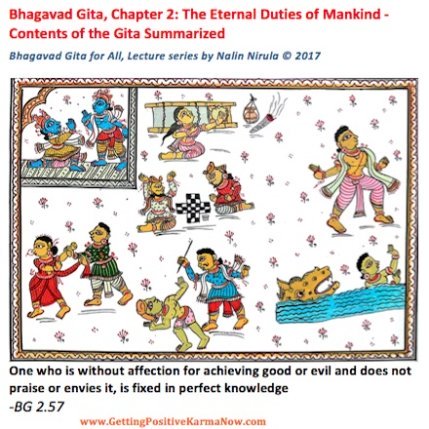
One who is without affection for achieving good or evil and does not praise or envies it, is fixed in perfect knowledge.
Bhagavad Gita 2.56
duḥkheṣv anudvigna-manāḥ
sukheṣu vigata-spṛhaḥ
vīta-rāga-bhaya-krodhaḥ
sthita-dhīr munir ucyate
Synonyms
duḥkheṣu — in the threefold miseries; anudvigna-manāḥ — without being agitated in mind; sukheṣu — in happiness; vigata-spṛhaḥ — without being interested; vīta — free from; rāga — attachment; bhaya — fear; krodhaḥ — and anger; sthita-dhīḥ — whose mind is steady; muniḥ — a sage; ucyate — is called
Bhagavad Gita 2.57
yaḥ sarvatrānabhisnehas
tat tat prāpya śubhāśubham
nābhinandati na dveṣṭi
tasya prajñā pratiṣṭhitā
Synonyms
yaḥ — one who; sarvatra — everywhere; anabhisnehaḥ — without affection; tat — that; tat — that; prāpya — achieving; śubha — good; aśubham — evil; na — never; abhinandati — praises; na — never; dveṣṭi — envies; tasya — his; prajñā — perfect knowledge; pratiṣṭhitā — fixed
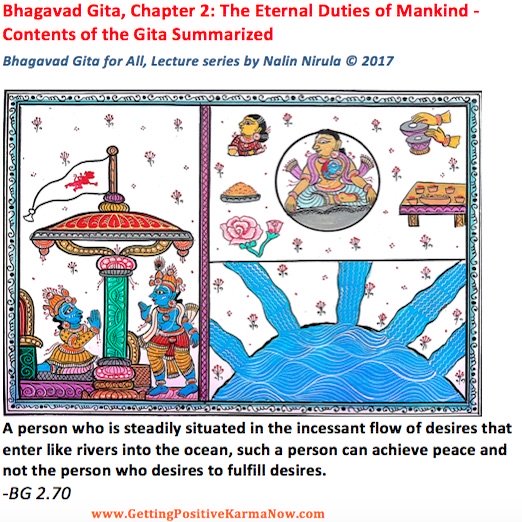
Bhagavad Gita 2.58
yadā saṁharate cāyaṁ
kūrmo ’ṅgānīva sarvaśaḥ
indriyāṇīndriyārthebhyas
tasya prajñā pratiṣṭhitā
Synonyms
yadā — when; saṁharate — winds up; ca — also; ayam — he; kūrmaḥ — tortoise; aṅgāni — limbs; iva — like; sarvaśaḥ — altogether; indriyāṇi — senses; indriya-arthebhyaḥ — from the sense objects; tasya — his; prajñā — consciousness; pratiṣṭhitā — fixed.
Bhagavad Gita 2.59
viṣayā vinivartante
nirāhārasya dehinaḥ
rasa-varjaṁ raso ’py asya
paraṁ dṛṣṭvā nivartate
Synonyms
viṣayāḥ — objects for sense enjoyment; vinivartante — are practiced to be refrained from; nirāhārasya — by negative restrictions; dehinaḥ — for the embodied; rasa-varjam — giving up the taste; rasaḥ — sense of enjoyment; api — although there is; asya — his; param — far superior things; dṛṣṭvā — by experiencing; nivartate — he ceases from.
Bhagavad Gita 2.60
yatato hy api kaunteya
puruṣasya vipaścitaḥ
indriyāṇi pramāthīni
haranti prasabhaṁ manaḥ
Synonyms
yatataḥ — while endeavoring; hi — certainly; api — in spite of; kaunteya — O son of Kuntī; puruṣasya — of a man; vipaścitaḥ — full of discriminating knowledge; indriyāṇi — the senses; pramāthīni — agitating; haranti — throw; prasabham — by force; manaḥ — the mind.
Bhagavad Gita 2.61
tāni sarvāṇi saṁyamya
yukta āsīta mat-paraḥ
vaśe hi yasyendriyāṇi
tasya prajñā pratiṣṭhitā
Synonyms
tāni — those senses; sarvāṇi — all; saṁyamya — keeping under control; yuktaḥ — engaged; āsīta — should be situated; mat-paraḥ — in relationship with Me; vaśe — in full subjugation; hi — certainly; yasya — one whose; indriyāṇi — senses; tasya — his; prajñā — consciousness; pratiṣṭhitā — fixed.
Bhagavad Gita 2.62
dhyāyato viṣayān puṁsaḥ
saṅgas teṣūpajāyate
saṅgāt sañjāyate kāmaḥ
kāmāt krodho ’bhijāyate
Synonyms
dhyāyataḥ — while contemplating; viṣayān — sense objects; puṁsaḥ — of a person; saṅgaḥ — attachment; teṣu — in the sense objects; upajāyate — develops; saṅgāt — from attachment; sañjāyate — develops; kāmaḥ — desire; kāmāt — from desire; krodhaḥ — anger; abhijāyate — becomes manifest.
Bhagavad Gita 2.63
krodhād bhavati sammohaḥ
sammohāt smṛti-vibhramaḥ
smṛti-bhraṁśād buddhi-nāśo
buddhi-nāśāt praṇaśyati
Synonyms
krodhāt — from anger; bhavati — takes place; sammohaḥ — perfect illusion; sammohāt — from illusion; smṛti — of memory; vibhramaḥ — bewilderment; smṛti–bhraṁśāt — after bewilderment of memory; buddhi–nāśaḥ — loss of intelligence; buddhi–nāśāt — and from loss of intelligence; praṇaśyati — one falls down.
Bhagavad Gita 2.64
rāga-dveṣa-vimuktais tu
viṣayān indriyaiś caran
ātma-vaśyair vidheyātmā
prasādam adhigacchati
Synonyms
rāga — attachment; dveṣa — and detachment; vimuktaiḥ — by one who has become free from; tu — but; viṣayān — sense objects; indriyaiḥ — by the senses; caran — acting upon; ātma-vaśyaiḥ — under one’s control; vidheya-ātmā — one who follows regulated freedom; prasādam — the mercy of the Lord; adhigacchati — attains.
Bhagavad Gita 2.65
prasāde sarva-duḥkhānāṁ
hānir asyopajāyate
prasanna-cetaso hy āśu
buddhiḥ paryavatiṣṭhate
Synonyms
prasāde — on achievement of the causeless mercy of the Lord; sarva — of all; duḥkhānām — material miseries; hāniḥ — destruction; asya — his; upajāyate — takes place; prasanna-cetasaḥ — of the happy-minded; hi — certainly; āśu — very soon; buddhiḥ — intelligence; pari — sufficiently; avatiṣṭhate — becomes established
Bhagavad Gita 2.66
nāsti buddhir ayuktasya
na cāyuktasya bhāvanā
na cābhāvayataḥ śāntir
aśāntasya kutaḥ sukham
Synonyms
na asti — there cannot be; buddhiḥ — transcendental intelligence; ayuktasya — of one who is not connected (with Kṛṣṇa consciousness); na — not; ca — and; ayuktasya — of one devoid of Kṛṣṇa consciousness; bhāvanā — fixed mind (in happiness); na — not; ca — and; abhāvayataḥ — of one who is not fixed; śāntiḥ — peace; aśāntasya — of the unpeaceful; kutaḥ — where is; sukham — happiness
Bhagavad Gita 2.67
indriyāṇāṁ hi caratāṁ
yan mano ’nuvidhīyate
tad asya harati prajñāṁ
vāyur nāvam ivāmbhasi
Synonyms
indriyāṇām — of the senses; hi — certainly; caratām — while roaming; yat — with which; manaḥ — the mind; anuvidhīyate — becomes constantly engaged; tat — that; asya — his; harati — takes away; prajñām — intelligence; vāyuḥ — wind; nāvam — a boat; iva — like; ambhasi — on the water.
Bhagavad Gita 2.68
tasmād yasya mahā-bāho
nigṛhītāni sarvaśaḥ
indriyāṇīndriyārthebhyas
tasya prajñā pratiṣṭhitā
Synonyms
tasmāt — therefore; yasya — whose; mahā-bāho — O mighty-armed one; nigṛhītāni — so curbed down; sarvaśaḥ — all around; indriyāṇi — the senses; indriya-arthebhyaḥ — from sense objects; tasya — his; prajñā — intelligence; pratiṣṭhitā — fixed.
Bhagavad Gita 2.69
yā niśā sarva-bhūtānāṁ
tasyāṁ jāgarti saṁyamī
yasyāṁ jāgrati bhūtāni
sā niśā paśyato muneḥ
Synonyms
yā — what; niśā — is night; sarva — all; bhūtānām — of living entities; tasyām — in that; jāgarti — is wakeful; saṁyamī — the self-controlled; yasyām — in which; jāgrati — are awake; bhūtāni — all beings; sā — that is; niśā — night; paśyataḥ — for the introspective; muneḥ — sage.
Bhagavad Gita 2.70
āpūryamāṇam acala-pratiṣṭhaṁ
samudram āpaḥ praviśanti yadvat
tadvat kāmā yaṁ praviśanti sarve
sa śāntim āpnoti na kāma-kāmī
Synonyms
āpūryamāṇam — always being filled; acala-pratiṣṭham — steadily situated; samudram — the ocean; āpaḥ — waters; praviśanti — enter; yadvat — as; tadvat — so; kāmāḥ — desires; yam — unto whom; praviśanti — enter; sarve — all; saḥ — that person; śāntim — peace; āpnoti — achieves; na — not; kāma-kāmī — one who desires to fulfill desires.
Bhagavad Gita 2.71
vihāya kāmān yaḥ sarvān
pumāṁś carati niḥspṛhaḥ
nirmamo nirahaṅkāraḥ
sa śāntim adhigacchati
Synonyms
vihāya — giving up; kāmān — material desires for sense gratification; yaḥ — who; sarvān — all; pumān — a person; carati — lives; niḥspṛhaḥ — desireless; nirmamaḥ — without a sense of proprietorship; nirahaṅkāraḥ — without false ego; saḥ — he; śāntim — perfect peace; adhigacchati — attains
Bhagavad Gita 2.72
eṣā brāhmī sthitiḥ pārtha
naināṁ prāpya vimuhyati
sthitvāsyām anta-kāle ’pi
brahma-nirvāṇam ṛcchati
Synonyms
eṣā — this; brāhmī — spiritual; sthitiḥ — situation; pārtha — O son of Pṛthā; na — never; enām — this; prāpya — achieving; vimuhyati — one is bewildered; sthitvā — being situated; asyām — in this; anta–kāle — at the end of life; api — also; brahma–nirvāṇam — the spiritual kingdom of God; ṛcchati — one attains.